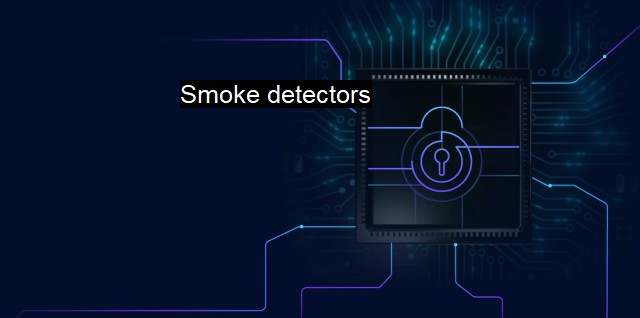What are Smoke detectors?
The Importance of Smoke Detectors: How Antivirus Software Applies the Concept of Early Warning to Cybersecurity
Concepts and devices often borrow names from our physical lives. One such term is "smoke detectors." Just as we have smoke detectors in our homes and offices that alert us for potential fire risks, the cybersecurity sector has ingeniously employed smoke detectors within our digital landscapes. Unlike their physical counterparts which detect changes in air composition, in a digital context, these tools work to identify suspicious or malicious activities.In the multifaceted sphere of cybersecurity, "smoke detectors" are sophisticated analytical programs that proactively monitor for and warn against cyber threats. They work under many aliases but often manifest as functionalities constructed into antivirus or other types of protective software. These functions serve to enhance the capacity of the antivirus application by enabling it to recognize unusual activities that may potentially harm the computer.
Similar to a fire alarm's continuous check for harmful smog or abrupt temperature fluctuations, the digital smoke detector operates as a real-time oversight system that incessantly screens system activities, online traffic, data flow, file behaviors, and numerous other areas that are highly susceptible to external tampering. It remains vigilant at all times, ready to alert the user instantly if it identifies any sign of potential danger like overheating, slowing down, or sudden changes to the computer’s vital files.
This threat intelligence system can help discover different types of threats like viruses, worms, trojans, ransomware, spyware, adware, and more that may harm the computer. Each cybersecurity threat type will enact unique file behavior that the "smoke detector" watches out for precisely. Their operators adjust them or program them with heuristics and other types of affirmative analysis that empower the tool for these diversified attacks.
In the distinctive happening of an attack, these detectors trigger an alarm. Consequently, your antivirus solution aims to isolate the malicious behavior, terminate its proceedings, correct the unauthorized changes, and, in some scenarios, also report the malevolent episode back to a centralized database or the antivirus software manufacturing company for the sake of contributing to the broader security solution in the battle against cyber attacks. By doing so, it not only aids in dealing with the existing attack but also assists in preparing for future encounters of a similar nature.
Imagine the cybersecurity landscape to be a sand-grain counting mechanism. In a world inundating with innumerable hardware pieces, amassing colossal measures of data every moment, an antivirus ‘smoke detector’ plays a crucial role. The detector’s responsibilities and primary research are not highlighted repeatedly, yet they remain possibly one of the central antivirus features that keep our digital journeys secure.
These technologies remain efficient at all times, always vigilant and meticulously attentive. They adapt to newer and emerging threats. When a novel virus or a kind of cyber-attack direction is unveiled, these innovative tools learn to identify new patterns of malicious behavior, making them constantly evolve and be ready for any assault, no matter how unprecedented.
In an era of increasing technological integration, where every digital data bit is highly cherished yet incredibly vulnerable, the importance of digital ‘smoke detectors’ cannot be overstated. Despite bearing huge similarities to real-world fire alarms, these may often be easy to overlook in the vast myriad of sophistications packaged into antivirus groups but they remain indispensably vital as our foremost defense line against the various forms of contemporary cyber threats. digital 'smoke detectors' are a combination of advanced technology and innovation that ensures the high-end security of data and processes in the ever-evolving world of cybersecurity.

Smoke detectors FAQs
What is a smoke detector?
A smoke detector is an electronic device that is designed to detect smoke and alert people of potential fire hazards.What types of smoke detectors are there?
There are two main types of smoke detectors: ionization and photoelectric detectors. Ionization detectors use a small amount of radioactive material to detect the presence of smoke particles in the air, while photoelectric detectors use a beam of light to detect smoke.How do smoke detectors relate to cybersecurity and antivirus?
Smoke detectors relate to cybersecurity and antivirus in the sense that they both detect and alert users to potential threats. Like antivirus software, smoke detectors monitor and analyze data in order to determine whether there is a potential danger.Do smoke detectors require maintenance?
Yes, smoke detectors require regular maintenance to ensure they are functioning properly. This includes testing the batteries and sensors, cleaning the detectors, and replacing them as needed. It is recommended to test smoke detectors at least once a month and replace the batteries twice a year.| | A | | | B | | | C | | | D | | | E | | | F | | | G | | | H | | | I | | | J | | | K | | | L | | | M | |
| | N | | | O | | | P | | | Q | | | R | | | S | | | T | | | U | | | V | | | W | | | X | | | Y | | | Z | |
| | 1 | | | 2 | | | 3 | | | 4 | | | 7 | | | 8 | | |||||||